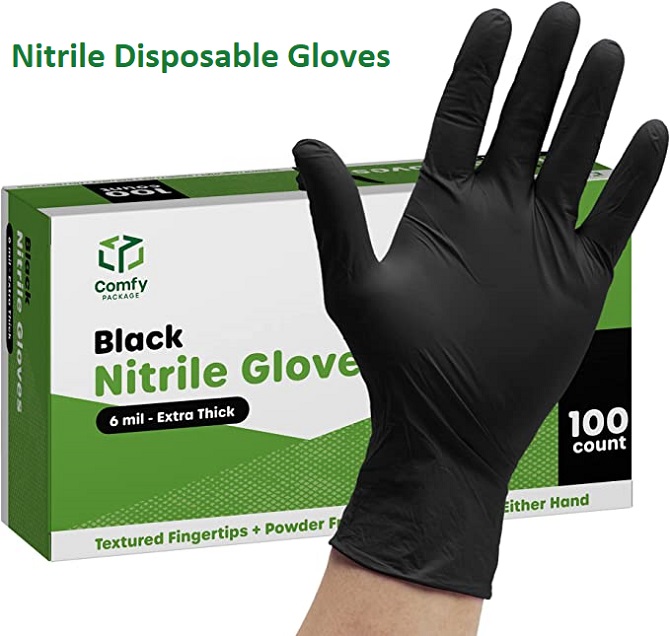Disposable nitrile gloves are commonly used in many different industries, including medical, industrial, and personal uses. These gloves are made from synthetic rubber, which provides excellent durability and puncture resistance. In this blog post, we will discuss the various uses of disposable nitrile gloves and their benefits and drawbacks.
Contents
How To Use Nitrile Gloves at Home
Nitrile gloves are a useful tool for various tasks around the home, from cleaning and cooking to gardening and personal hygiene. Here are some tips on how to use nitrile gloves at home:
Choose the Right Size: Make sure to select nitrile gloves that fit your hands properly. Gloves that are too tight can be uncomfortable and limit dexterity, while gloves that are too loose can be prone to slipping off.
Properly Don and Doff the Gloves
When putting on nitrile gloves, be sure to pull them on over your fingers and hands until they fit snugly. To remove them, grasp the cuff of one glove and pull it off, being careful not to touch the outside of the glove. Then, use your bare hand to pull off the other glove in the same way.
Use Gloves for Cleaning
Disposable gloves are an excellent choice for cleaning tasks around the home, such as scrubbing the bathroom or kitchen. They can protect your hands from harsh chemicals and detergents while allowing you to maintain a good grip on cleaning tools.
Use Gloves for Cooking
Nitrile gloves are also useful when handling food, especially when working with raw meat or fish. They can protect your hands from harmful bacteria and help prevent cross-contamination.
Use Gloves for Gardening
Nitrile gloves are a must-have for gardening tasks, such as planting and weeding. They can protect your hands from thorns, sharp tools, and dirt while allowing you to maintain a good grip on gardening tools.
Use Gloves for Personal Hygiene
Nitrile gloves can also be useful for personal hygiene tasks, such as cutting your nails or applying ointment. They can prevent the spread of germs and help keep your hands clean.
Dispose of Gloves Properly
After use, dispose of nitrile gloves properly by putting them in a trash can. Do not flush them down the toilet, as they can clog pipes and harm the environment.
Gloves are a versatile tool for various tasks around the home. By following these tips on how to use nitrile gloves at home, you can ensure that you are using them safely and effectively.
What Are Disposable Nitrile Gloves Used For
Medical Uses
Disposable nitrile gloves are widely used in the medical industry to protect healthcare workers and patients from infectious diseases. These gloves are especially useful for handling blood, bodily fluids, and medications that could pose a health risk. They are also commonly used during examination and diagnostic procedures. In addition, nitrile gloves are resistant to many chemicals, making them an excellent choice for handling hazardous substances.
Industrial Uses
Gloves are also used extensively in various industrial settings to protect workers from chemicals, oils, and solvents. They are particularly useful for tasks that involve cleaning and janitorial duties. Nitrile gloves are also used in food handling and preparation to prevent contamination.
Personal Uses
Disposable gloves are not just limited to professional use. They are also popular for personal use for tasks such as cleaning, household chores, gardening, and outdoor activities. In addition, many people use them for protection during travel and public interactions, especially during times of high contagion risk.
Advantages
There are many advantages of using disposable nitrile gloves. They are known for their high level of durability and puncture resistance, which makes them ideal for tasks that require manual dexterity and handling sharp objects. Nitrile gloves are also allergy-free, making them an excellent choice for people with latex allergies. They offer excellent tactile sensitivity, allowing users to feel and manipulate objects with ease.
Disadvantages
While disposable gloves have many advantages, there are also some disadvantages to consider. For example, they are not biodegradable, which means they can contribute to environmental pollution. Nitrile gloves are also less comfortable than latex gloves, which can make them less appealing for extended use. Finally, nitrile gloves are typically more expensive than vinyl gloves, which may make them less accessible for some users.
Conclusion
Nitrile gloves are versatile and widely used in various industries and personal settings. They provide excellent protection against infection and chemicals, making them a popular choice in medical and industrial environments. Nitrile gloves also offer many benefits, such as their durability, puncture resistance, and tactile sensitivity.
They also have some drawbacks, such as being non-biodegradable and less comfortable than latex gloves. It is essential to choose the appropriate gloves for each task to ensure safety and comfort. It remains a valuable tool in protecting users from potential harm.

